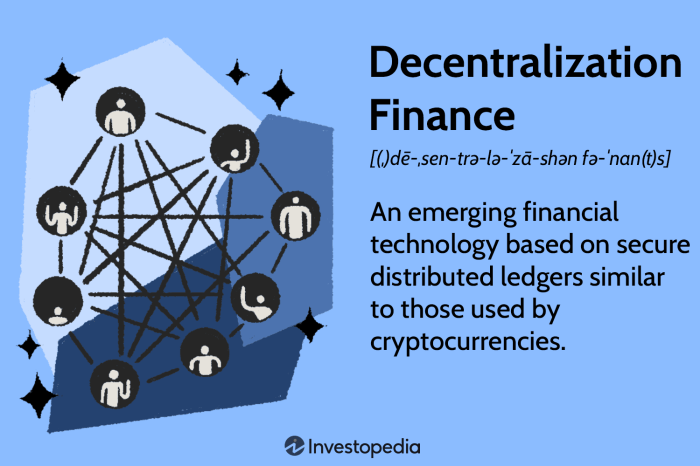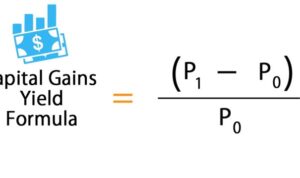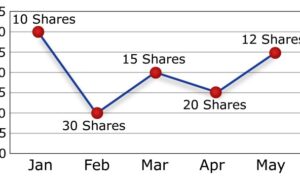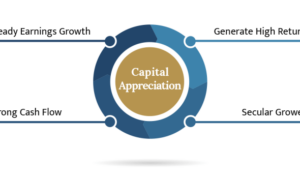Diving headfirst into the realm of decentralized finance (DeFi), this intro will take you on a wild ride through the world of finance like never before. Get ready to explore the ins and outs of this cutting-edge concept with a high school hip twist that’ll leave you wanting more.
In the following paragraphs, we’ll break down the key aspects of DeFi, from its unique features to the potential risks and rewards it offers. So buckle up and let’s dive in!
What is Decentralized Finance (DeFi)?
Decentralized Finance (DeFi) is a financial system built on blockchain technology that aims to provide an open and permissionless ecosystem for financial activities without the need for traditional intermediaries like banks or brokerages.
DeFi differs from traditional finance in that it operates on decentralized networks, allowing users to access financial services such as lending, borrowing, trading, and investing directly through smart contracts and decentralized applications (dApps). This eliminates the need for centralized authorities and reduces barriers to entry for individuals worldwide.
Examples of DeFi Applications and Platforms
- Uniswap: A decentralized exchange (DEX) that allows users to swap various cryptocurrencies without a central authority.
- Compound: A lending platform that enables users to earn interest on their cryptocurrency holdings by supplying assets to the protocol.
- Aave: A decentralized lending platform that offers users the ability to borrow and lend a variety of cryptocurrencies.
Benefits of DeFi
Decentralized Finance (DeFi) comes with a range of advantages that set it apart from traditional financial systems. Let’s take a closer look at how DeFi can benefit users.
Financial Inclusion
DeFi plays a crucial role in promoting financial inclusion by providing access to financial services for individuals who are underserved or excluded by traditional banking systems. Through DeFi platforms, users can access a variety of financial products and services without the need for a middleman or centralized authority, leveling the playing field for all participants.
Potential for High Returns
One of the key attractions of DeFi is the potential for high returns on investments. By participating in DeFi protocols such as liquidity provision, yield farming, or staking, users can earn attractive yields on their crypto assets. These opportunities for generating passive income make DeFi an appealing option for investors looking to grow their wealth in a decentralized and transparent manner.
Risks and Challenges in DeFi
Decentralized Finance (DeFi) offers numerous benefits, but it also comes with its fair share of risks and challenges. Understanding these potential pitfalls is crucial for anyone involved in DeFi platforms.
Risks Associated with DeFi
- Smart Contract Risks: DeFi platforms heavily rely on smart contracts, which are susceptible to bugs and vulnerabilities. A single mistake in the code can lead to significant financial losses.
- Market Volatility: The cryptocurrency market is known for its extreme volatility. Sudden price fluctuations can result in substantial losses for DeFi users.
- Lack of Regulation: DeFi operates in a largely unregulated environment, leaving users vulnerable to scams and fraudulent activities.
Security Concerns in DeFi Platforms
- Centralized Points of Failure: While DeFi aims to eliminate intermediaries, some platforms still have centralized points of failure that can be exploited by hackers.
- Asset Security: Storing assets in DeFi wallets exposes them to potential hacks and theft. Users must take extra precautions to secure their funds.
- Phishing Attacks: DeFi users are often targeted by phishing attacks, where malicious actors trick them into revealing sensitive information or sending funds to fake addresses.
Challenges of Regulating DeFi
- Cross-Border Nature: DeFi operates globally, making it challenging for regulators to enforce consistent rules across different jurisdictions.
- Innovative Technology: Regulating DeFi platforms requires a deep understanding of blockchain technology and smart contracts, which can be complex for traditional regulatory bodies.
- Anonymity Concerns: DeFi allows users to transact anonymously, raising concerns about money laundering, terrorist financing, and other illicit activities that may go undetected without proper regulation.
Decentralized Finance Ecosystem

Decentralized Finance (DeFi) ecosystem is a network of interconnected components that work together to provide decentralized financial services using blockchain technology. These components include various protocols, applications, and platforms that enable users to access financial services without the need for traditional intermediaries.
Smart Contracts in DeFi
Smart contracts play a crucial role in the DeFi ecosystem by automating the execution of financial transactions without the need for intermediaries. These self-executing contracts are coded on blockchain networks and enable trustless interactions between parties. Smart contracts ensure transparency, security, and efficiency in DeFi protocols by eliminating the need for manual intervention.
Interaction Between DeFi Protocols
The interaction between different DeFi protocols is essential for the seamless operation of the ecosystem. Various DeFi protocols such as lending, borrowing, decentralized exchanges, and asset management platforms work together to create a comprehensive financial ecosystem. For example, users can borrow assets from lending protocols, swap tokens on decentralized exchanges, and earn interest on their holdings through yield farming protocols. This interoperability between different protocols enhances the overall efficiency and liquidity of the DeFi ecosystem.
Popular DeFi Projects
When it comes to decentralized finance (DeFi), there are several well-known projects that have made a significant impact on the industry. These projects offer various features and services that cater to different needs within the DeFi ecosystem.
Compound Finance
Compound Finance is a popular DeFi platform that allows users to lend and borrow cryptocurrencies. One of its key features is the ability to earn interest on deposited assets or take out loans using collateral. It has gained popularity for its user-friendly interface and competitive interest rates.
Uniswap
Uniswap is a decentralized exchange (DEX) that enables users to swap various ERC-20 tokens without the need for a traditional order book. Instead, it uses an automated market maker system to facilitate trades. Uniswap has become one of the most widely used DEX platforms due to its liquidity pools and low fees.
Aave
Aave is a DeFi lending platform that allows users to earn interest on their deposits and borrow assets using collateral. It offers a wide range of assets for lending and borrowing, as well as innovative features such as flash loans. Aave has gained traction for its unique borrowing options and security features.
MakerDAO
MakerDAO is a decentralized autonomous organization (DAO) that governs the stablecoin DAI. Users can generate DAI by locking up collateral in smart contracts, providing stability to the token’s value. MakerDAO’s governance model and decentralized nature have made it a cornerstone of the DeFi industry.
Yearn Finance
Yearn Finance is a yield aggregator that automates the process of finding the highest yield for deposited assets across various DeFi platforms. It allows users to optimize their returns by moving funds between different protocols seamlessly. Yearn Finance has gained popularity for its hands-off approach to yield farming.
These popular DeFi projects have revolutionized the way people interact with financial services, offering new opportunities for earning and borrowing in a decentralized manner. The impact of these projects on the industry has been substantial, driving innovation and adoption of DeFi across the globe.






